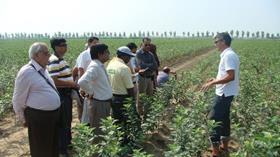
Italian nursery company Griba, which specialises in producing apple, pear and cherry trees, is gearing up to launch services in India after incorporating a local subsidiary there late last year.
Griba India has identified a site for its new nursery in India, with operations due to commence soon, according to the company’s business development manager Andreas De Rosi.
“The first trees should be available for growers in Himachal Pradesh and Kashmir by 2012/13,” he told Fruitnet.com.
The key goal for Griba India is to provide Indian apple growers with high-quality apple trees and introduce new varieties and rootstocks that are tailored to local growers’ needs, according to Mr De Rosi.
“The short-term plan is to develop production of 50,000 trees trying three or four different rootstocks and to forge strategic partnerships for the distribution of the trees with private companies that have cold storage facilities and grower networks in the apple producing areas,” he said.
With its parent company's record of consulting on orchard management, Griba India also wants to establish and coordinate larger apple orchard projects, or “turnkey projects”, in India, Mr De Rosi said.
“We see potential in India for new varieties, especially in the apple sector, and Griba would like to help the producers to introduce new systems in apple production,” he said. “Griba has the tools, know-how and extensive experience in production, both of trees and apples.”
One of the key challenges for Griba is to adapt systems to the Indian environment and to deliver trees that can perform under difficult climatic conditions. For instance, Himachal Pradesh, which together with Jammu & Kashmir accounts for the vast majority of Indian apple production, often endures two months of drought during the growing season.
“In order to address this, Griba will work with Indian advisors and it is going to hire an Indian agronomist who can collect feedback from Indian farmers and make necessary changes and improvements during the production of the trees,” said Mr De Rosi. “Italian agronomists will work site-on-site with Indian agronomists in India and Indian agronomists will also be given training in Italy.”
Another key hurdle is to change the traditional methods and mindsets of Indian apple growers. “Griba has to change the old apple growing system and train growers in the management of new apple orchards,” noted Mr De Rosi. “It will also need to sell few trees to many farmers spread across areas that are difficult to access and develop a network of agents who can provide guidance, advice and after-sales service to make sure branches are pruned correctly and trees are given the right fertilisers.”
Despite the sizeable challenges, however, Griba India is convinced that the market opportunities are much greater, not least the scope to develop domestic apple consumption in India.
“The opportunities focus on rising domestic demand and the big potential in terms of suitable apple growing areas. There is a high demand for high-quality apple trees in India,” said Mr De Rosi.
Low rates of productivity in India mean that the domestic industry is currently unable to meet that burgeoning demand. Average yields are currently put at around 6-7 tonnes per ha, less than half the world average and only a fraction of those for leading producers such as New Zealand.
In the longer term, Griba India also expects to play a key role on varietal development for the Indian apple sector. “Griba is already a license holder for proprietary apple varieties in other countries and it wants to take the same steps in India,” said Mr De Rosi. “Currently, protecting apple varieties is not possible in India, so only varieties that Griba owns will be introduced. This may change in the near future as IP law negotiations are under way between India and the EU.”



